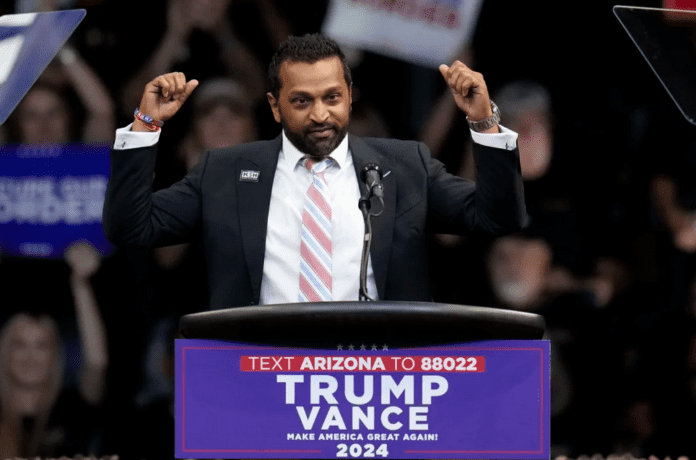The presidency of Donald Trump has been defined by a deep skepticism of traditional institutions, particularly those he perceives as hostile to his administration or aligned with his political adversaries. This skepticism has now crystallized into a bold and contentious decision: President-elect Trump’s announcement of Kash Patel as his choice for the next FBI director. Patel, a staunch Trump loyalist and vocal critic of the so-called “deep state,” embodies the ideological battle Trump has waged against what he views as entrenched institutional opposition.
A Bold Nomination in a Politicized Bureaucracy
Trump’s announcement on Truth Social underscores the central role loyalty plays in his selection process for high-level appointments. Referring to Patel as a “brilliant lawyer, investigator, and ‘America First’ fighter,” Trump positions the former chief of staff to the acting defense secretary as the antidote to a Bureau he alleges has been weaponized against him under the Biden administration. This announcement comes with the explicit intent to replace Christopher Wray, the current FBI director, years before his term expires—a move that promises to set the stage for a bitter political battle.
Wray, who was nominated by Trump in 2017 following the firing of James Comey, has been a thorn in the side of Trump’s post-presidency. Trump’s animosity toward Wray escalated after the FBI’s search of Mar-a-Lago in 2022 and subsequent indictments related to classified documents. Wray’s tenure has become emblematic, in Trump’s narrative, of a Bureau captured by partisan interests and used as a tool to undermine his presidency and legacy.
The Weaponization of the FBI: A Tale of Two Administrations
Under the Biden administration, Trump’s supporters argue, the FBI has transformed into a political weapon. Trump’s claims echo Patel’s fiery rhetoric, including his call to dismantle the Bureau’s Washington, D.C., headquarters and convert it into a “museum of the deep state.” For Trump, the FBI is not just a law enforcement agency but a battleground where political loyalty is paramount.
The notion of loyalty, however, raises serious concerns about the independence of federal institutions. The FBI director’s ten-year term was established in the aftermath of Watergate to insulate the position from political pressures. By openly advocating for Patel, Trump signals his intent to reconfigure the Bureau into an institution more aligned with his worldview—a move that could erode public confidence in its impartiality.
Patel: Firebrand or Reformer?
Kash Patel’s nomination exemplifies Trump’s tendency to choose polarizing figures for critical roles. Patel, who rose to prominence as an aide to Devin Nunes on the House Intelligence Committee, has built his reputation as a relentless critic of the FBI, particularly its handling of the Russia investigation.
His book, Government Gangsters: The Deep State, the Truth, and the Battle for Our Democracy, lambasts what he perceives as systemic corruption within law enforcement and intelligence agencies. Patel argues for a “comprehensive housecleaning” of the Justice Department and the FBI, framing his vision as a restoration of democracy rather than an attack on institutional norms.
A brilliant roadmap highlighting every corrupt actor, to ultimately return our agencies and departments to work for the American People…we will use this blueprint to help us take back the White House and remove these Gangsters from all of Government! (Donald J. Trump)
Yet, Patel’s fiery rhetoric and past statements, including calls to target members of the media and his controversial stance on dismantling intelligence agencies, have fueled widespread concern—even among Trump’s allies. Critics fear that Patel’s leadership could transform the FBI into a partisan tool, undermining its foundational mission to act as an impartial enforcer of federal law.
Loyalty vs. Independence: A Precarious Balance
Trump’s emphasis on loyalty reflects his broader approach to governance, wherein personal allegiance often outweighs professional qualifications. While loyalty can be a strength, particularly in turbulent times, it becomes problematic when it eclipses the need for institutional independence. Patel’s history as a vocal Trump ally suggests that his tenure could prioritize partisan objectives over the FBI’s traditional role as a neutral arbiter of justice.
The comparison to James Comey’s dismissal in 2017 is striking. Then, Trump cited the need to restore trust in the Bureau as a rationale for firing Comey, who had overseen investigations into Russian interference in the 2016 election. Now, Trump’s critics argue, Patel’s nomination risks compromising the very trust and independence he once claimed to defend.
A Senate Battle Looms
Patel’s confirmation process is likely to ignite a fierce Senate battle, testing the limits of Trump’s influence over the Republican Party. Even among Trump loyalists, Patel’s reputation as a “firebrand” and “relentless self-promoter” has raised doubts. His nomination may hinge on whether Senate Republicans are willing to prioritize Trump’s vision of the FBI over concerns about its long-term institutional integrity.






